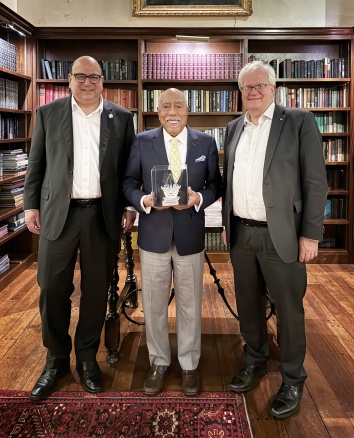The GMTO Corporation, the 501(c)(3) nonprofit and international consortium building the Giant Magellan Telescope, today announced a leadership transition on its Board of Directors. After nearly a decade of leadership as chair, Walter Massey is retiring. The board has elected McDonald Observatory Director Taft Armandroff as its new chair and Nobel Laureate Brian Schmidt as vice chair.
Massey’s tenure guided the Giant Magellan Telescope through key design and construction milestones, helped secure nearly $500 million in private and public funding, and expanded the international consortium from 11 to 16 members. A physicist, educator, and national science leader, Massey has held transformative roles including director of the National Science Foundation, director of Argonne National Laboratory, president of Morehouse College and the School of the Art Institute of Chicago, and member of the Board of Regents of the Smithsonian Institution. He has also served on the boards of BP, the Rand Corporation, and the Andrew W. Mellon Foundation, and was chairman of Bank of America. Massey will remain actively involved in the observatory’s success as special advisor to the GMTO Corporation, and his legacy will be celebrated by leaders in science, art, education, philanthropy, and government at the inaugural Giant Magellan Gala this November at the Adler Planetarium in Chicago.
“It has been an honor guiding the Giant Magellan Telescope through this defining chapter,” said Massey. “This next generation observatory stands at the intersection of global collaboration and curiosity. I’m deeply proud of what we’ve achieved together, and I look forward to seeing the telescope reach first light under Taft’s leadership.”
Armandroff is a distinguished leader in astronomy, observatory operations, and instrumentation. He currently serves as director of the McDonald Observatory and professor of astronomy at The University of Texas at Austin, holding the Frank and Susan Bash Endowed Chair. Prior to UT Austin, he served as observatory director at the W.M. Keck Observatory and associate director of the National Optical Astronomy Observatory (now known as NOIRLab). He has been recognized with prestigious honors, including the Distinguished Alumnus Award at Wesleyan University, the AURA Science Award, and the Dirk Brouwer Prize at Yale.
Armandroff’s research focuses on dwarf spheroidal galaxies, globular clusters, and stellar populations in the Milky Way and nearby galaxies. As a long-serving board member and former vice chair of the GMTO Corporation Board of Directors since 2016, he has played a central role in guiding strategic initiatives behind the Giant Magellan Telescope.
“Walter’s leadership over the last decade has been truly inspiring,” said Armandroff. “He built a strong foundation for one of the most ambitious scientific instruments ever conceived. I am deeply grateful to our international consortium for entrusting me with this role and look forward to working together to bring the Giant Magellan Telescope to life.”
As vice chair, Brian Schmidt brings extensive international scientific leadership to the Giant Magellan Telescope. A Nobel Laureate in physics for his groundbreaking work on the accelerating expansion of the universe, he is a distinguished professor of astronomy at the Australian National University and served as vice chancellor and president of ANU, where he advanced major research initiatives and international collaborations. Schmidt is widely recognized for his leadership in large-scale astronomy projects, public engagement in science, and advocacy for global scientific partnerships. He is also a recipient of the Shaw Prize, Gruber Prize, and Breakthrough Prize in Fundamental Physics.
“The Giant Magellan Telescope shows what the international astronomy community can accomplish together,” Schmidt said. “I am honored to work alongside Taft and the GMTO Corporation Board of Directors as we take the next step toward a new era of discovery that will transform our understanding of the universe.”
With this leadership transition, the board reaffirms its commitment to completing the next phase of construction — with more than 40% of the project already underway — advancing toward a successful National Science Foundation Final Design Review and continuing to secure the private and public funding needed to bring the observatory to completion in the 2030s.






